The new elevated viaduct in Progreso begins operations Nov 26, 2025 Progresohoy
This Wed, Nov 26, the new elevated viaduct in Progreso finally began operations, a project carried out by the state and federal governments with the aim of removing heavy cargo from the streets of the municipality and redirecting it towards the new elevated roadway.
The project officially opens after two years and two months of work, having started on June 13, 2023 and concluded on August 31, 2025, although it remained inoperative for almost three months despite being finished.
The lack of access generated growing discontent among residents, as trucks continued to circulate on 46th, 25th, and 86th Streets, causing damage, creating hazards, and disrupting residential areas. During this period, residents held at least six protests and blockades to demand that heavy traffic be diverted to the viaduct, as had been promised since the project’s inception.
The conflict reached its peak last week when residents of the affected areas carried out their sixth consecutive blockade to prevent trucks from passing. The action paralyzed cargo, maritime, and port activity for almost two days, causing millions of dollars in economic losses and forcing the direct intervention of authorities to resolve the crisis and definitively set the opening of the elevated viaduct for today.
Following a meeting with the concerned residents, state and municipal authorities signed a document committing to a series of actions aimed at resolving the conflict and restoring normalcy to the affected neighborhoods. Key agreements include:
1. Open the elevated viaduct to tractor-trailer traffic on November 26, 2025.
2. Gradually remove all heavy-duty tractor-trailers currently traveling on 46th and 25th Streets by December 30.
3. Maintain 86th Street as a free-flowing, two-way route for heavy-duty traffic, since the viaduct is a toll road—averaging one dollar per ton—and some carriers may choose not to use it.
4. Return 46th Street to its original two-way traffic, as established in the City Council minutes previously approved by the City Council.
5. Repaint the speed bumps installed on 46th and 25th Streets to improve visibility and safety, an action carried out days after the meeting.
6. Progressively remove all signs and placards indicating “free passage” on 46th and 25th Streets, returning them to their original state.
Although not all residents signed the agreement, most expressed confidence that the authorities would fulfill their commitments and that the opening of the viaduct would mark the beginning of a definitive solution to the problems caused by heavy truck traffic in the city.
Erik Rihani brings free flu vaccinations to families in Progreso Nov 25, 2025 ProgresoHoy
The Progreso City Council invites the entire population to participate in the Influenza Vaccination Campaign, carried out by the Health Department in coordination with the Comprehensive Health Services Center (CESSA).
The event will take place this Friday, November 28, in the basement of the Municipal Palace, from 8:00 am to 1:00 pm
It’s worth noting that a flu vaccination drive was also held last Monday, November 24th. With these actions, the City Council, led by Mayor Erik Rihani González, continues to strengthen its comprehensive plan to protect the health of Progreso residents.
This campaign is essential to protect the population, especially the most vulnerable groups, from respiratory illnesses.
With this purpose, the mayor is reinforcing municipal efforts to bring preventive services closer and promote a culture of care and community responsibility.
These actions reflect the commitment of the authorities to prevent risks, reduce infections and guarantee the well-being of the citizens.
Gómez Ordoñez strongly encouraged the public to get vaccinated, noting that the campaign is open to everyone, including children six months and older. The requirements to participate are:
Children (from 6 months of age):
-CURP
-Vaccination card
General public:
-Vaccination card or INE (National Electoral Institute ID)
The City Council urges residents to take advantage of this free service. Looking after our health is everyone’s responsibility, and prevention is the best way to protect our community. Your participation helps maintain a safer and better-prepared Progreso for the flu season.
First Toronto-Merida flight kicks off winter season of international flights to Yucatan

The State Government kicked off the winter international flight season with the early arrival of the Toronto-Mérida flight, marking the beginning of one of the most important periods for tourism in the state, which attracts thousands of visitors from the United States and Canada each year.
The head of the Ministry of Tourism Development (Sefotur), Darío Flota Ocampo, highlighted that this early start to operations reflects the growing interest of international tourists in Yucatán, a result of the collaborative work between the State Government and the airlines that have confidence in the destination.
Flota Ocampo emphasized that coordination with the private sector has been key to strengthening air connectivity and positioning the state as a leader in the international market.
He also noted that in previous years the winter season began in November and ended in April, while this year it began on October 28 and will end on May 19, further solidifying Yucatán as a reliable and attractive destination, especially for North American tourists.
The head of the Ministry of Tourism (Sefotur) stated that these achievements reflect the vision of economic and social development promoted by Governor Joaquín Díaz Mena through the Mayan Renaissance strategy, which fosters tourism diversification and sustainable growth in the sector.
According to information from the Southeast Airport Group (ASUR), the first Toronto-Mérida flight, operated by WestJet, arrived with 130 passengers on board, out of a total capacity of 174 seats, reaching 76 percent occupancy, officially marking the start of operations for this international air connection.
The Toronto-Mérida route will progressively increase its frequencies. From October 28 to November 9, it will operate once a week, on Tuesdays.
From November 10 to December 14, it will increase to two weekly flights, on Tuesdays and Thursdays, and from December 15 to April 5, it will offer three weekly flights, on Tuesdays, Thursdays, and Sundays.
This offering will be complemented by the Los Angeles–Mérida flight, operated by Viva Airlines, which will begin on December 14 with weekly service on Sundays, running through the year-end holiday season until January 11, 2026.
This route will return permanently during the second half of 2026, providing Yucatecan and American passengers with a new, reliable year-round international option.
With the activation of these routes and the continued strengthening of air connectivity, Yucatán continues to solidify its position as a world-class tourist destination, renowned for its cultural richness, natural beauty, and hospitality.
Prolimpia celebrates its sixth year of operations in Progreso
November 21, 2025 Progress Today
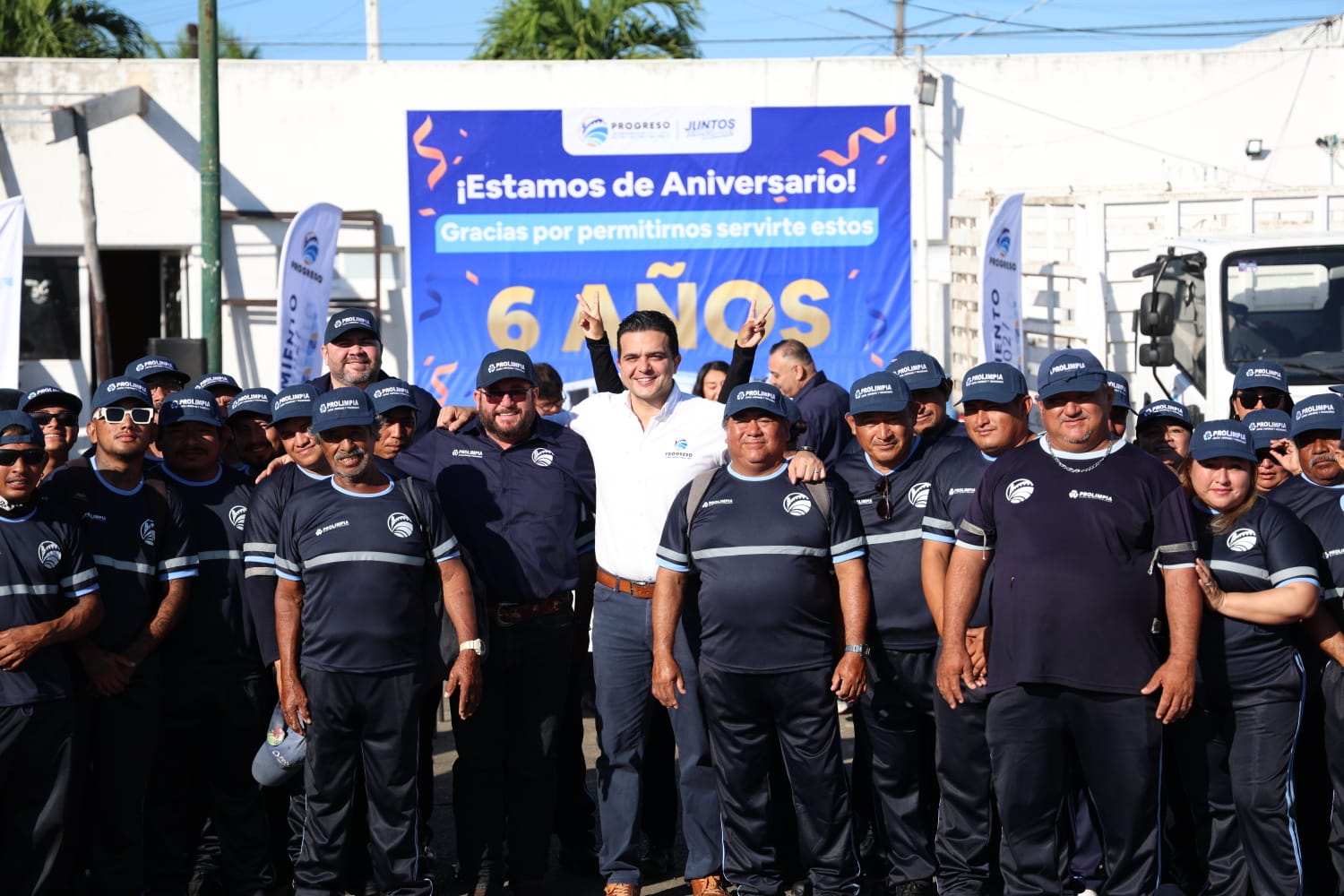
This month, the Prolimpia Integrated Solid Waste Management Department celebrates its sixth anniversary. To commemorate this milestone, Mayor Erik Rihani González met with the men and women who face the daily challenges of garbage collection in both the municipal seat and the six outlying communities.
Amid anecdotes and experiences, the mayor highlighted the close relationship between himself and the Prolimpia staff, noting that one of the agency’s first directors was Rihani González. Accompanied by the current director, David Eduardo Escalante Echeverría, the mayor expressed his gratitude for the staff’s dedication in building a team that sustains one of the most essential public services: waste management.
“A little over a year ago, I asked David to take over the management of Prolimpia. I told him something like: There’s a great team here; they just need to be heard and motivated. We have to eliminate the line between employee and boss, without losing respect, because that allows us to communicate and understand the problems. And when you understand, you can provide solutions,” he recalled.
The mayor emphasized that, although six years ago some doubted the future of Prolimpia, today the agency has a solid logistics system to meet the needs of the municipality.
“It’s not an easy task. We’ve worked to improve the vehicle fleet, which now has twelve compactor units operating practically every day. And if one breaks down, we can cover the routes to resolve the issue immediately,” he added.
For his part, Escalante Echeverría acknowledged the daily efforts of the sanitation workers:
“Each of you redoubles your efforts regardless of whether it is cold, hot, raining, or sunny. Here you have, Mayor, a team that works from Monday to Sunday, even on holidays.”
He also reiterated Prolimpia’s commitment to sustainability, environmental protection, and the promotion of recycling and reuse practices.
During the commemoration, uniforms were given to around 107 workers, as well as special footwear to the collection staff, represented on this occasion by Susana Barbosa and José Gutiérrez.
Throughout this sixth year, Prolimpia strengthened permanent cleanup campaigns and collaborated with agencies such as the Metropolitan Waste Management System SIGER Mérida and with associations such as Limpiemos Yucatán, in favor of environmental care.
The event concluded with the traditional cake cutting. Beforehand, the mayor delivered a closing message:
“A year ago, I asked for your trust and patience. I hope I haven’t disappointed you. I know we haven’t reached our full potential yet, but we will continue working. You perform an invaluable service. Thank you for another year of service to our community.”
Also present were the municipal secretary José Efraín Escalante Domínguez and the deputy director of Prolimpia, José Francisco Alonzo Muñoz.
More than 860 kilos of waste removed from wetlands on the eastern coast of Yucatán
Yucatan Times Nov 19, 2025

State authorities, municipal staff, and numerous volunteers participated in a large-scale cleanup of the wetlands in this municipality, where they removed 862 kilograms of trash, an amount close to one ton.
The activity was carried out as part of the Allies for Life program, an initiative of the Ministry of Welfare in coordination with the Río Lagartos City Council.
The cleanup efforts extended from the Chiquilá beach area to various sections of the local wetlands, considered priority areas due to their environmental importance. During the cleanup, teams worked among mangroves and coastal vegetation to remove debris trapped in the roots, as well as cleaning areas of the dock where floating materials were degrading water quality and harming the estuary’s wildlife.
In total, the collected trash was divided into 836 kilograms of common waste, 16 kilograms of PET plastic, nine kilograms of glass, and one kilogram of aluminum—figures that reflect the pressure that human activities exert on these fragile ecosystems.
At the start of the cleanup, Antonio Homa Serrano, Undersecretary of Welfare, and biologist José Cruz Hoil Rajón, Municipal Director of Ecology and Sustainable Development, were present. They thanked Governor Joaquín Díaz Mena for his support and emphasized the importance of Río Lagartos being part of these conservation efforts.
The authorities stressed the need to protect the region’s natural areas—such as mangroves, dunes, and nesting grounds—and emphasized that actions like reforestation and waste cleanup contribute directly to ecological balance and the protection of species.
The day concluded with recognition for the volunteers who, despite the intense heat and challenging terrain, successfully removed waste that posed a risk to biodiversity and the port’s image as a tourist destination. Organizers emphasized that this work provides “a respite for nature” and strengthens community participation in support of sustainability.
Progreso Interchange Bridge to Open and Improve Heavy Cargo Traffic Yucatan Times Nov 20, 2025
The new Progreso Interchange will open on November 26 to expedite cargo transport and strengthen logistics at Yucatán’s main port.
Next week, the Progreso Interchange, a new infrastructure designed exclusively for heavy cargo vehicles, will begin operations. Its objective is to improve safety, connectivity, and logistical efficiency at Yucatán’s main port. Its opening is scheduled for Wednesday, November 26, at 8:00 a.m., following the successful completion of a testing period that began on November 6.
During this phase, the operating systems, signage, and traffic control were evaluated, verifying that the interchange meets the necessary standards for safe and orderly operation. The project will expedite access to and from the port area for heavy transport, reduce traffic congestion in the urban area of ??Progreso, and improve mobility for both residents and visitors.
The infrastructure will also allow for a more efficient separation of cargo and local traffic flows, promoting safer and more organized road use. Various federal, state, and municipal authorities will participate in the opening process, including Asipona Progreso, the State Government through the General Secretariat of Government and Incay, the Ninth Naval Zone, the Progreso City Council, the SICT, and Unaprop.
With the opening of the Interchange, Progreso is moving toward a more modern and competitive port model, consolidating its strategic importance for trade and logistics in southeastern Mexico, while Yucatán positions itself as a leader in key infrastructure for regional development.
New street blockade in Progreso in protest against trucks
They reiterate their request: no more trailers and open the elevated viaduct for heavy cargo. Nov 18, 2025 Progress Today
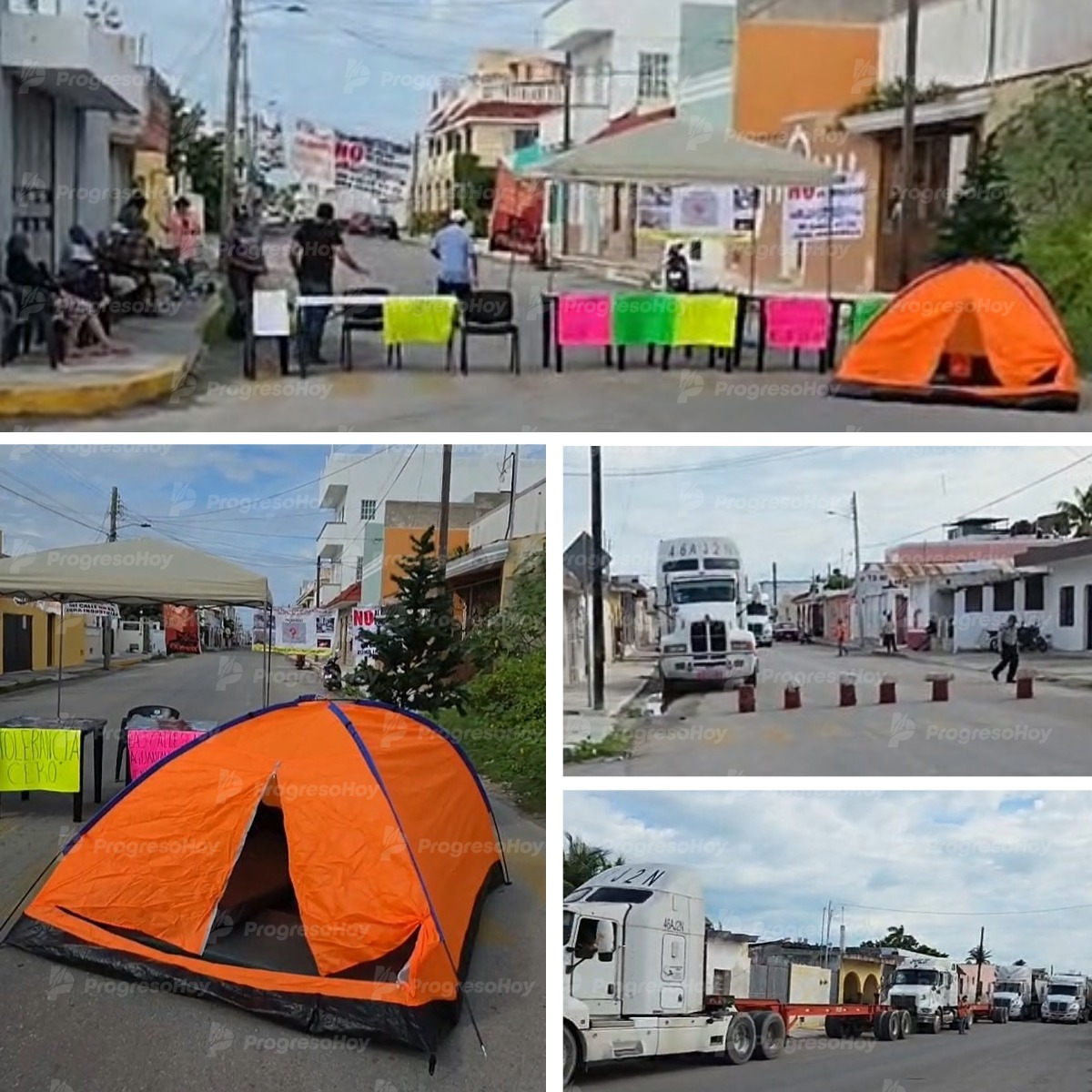
PROGRESO – As anticipated, residents of this port city blocked 25th Street at the intersection with 62nd Street at 8:00 a.m. this Tuesday to protest the passage of tractor-trailers through the city streets.
The residents reiterated that Progreso’s streets are residential, not industrial.
They demanded that state, federal, and municipal authorities do everything necessary to open the Progreso elevated viaduct, which was built for this purpose but, they said, is still not operational due to “disagreements” over the toll.
This time, in what would be their sixth protest, the residents set up chairs, tables, a tent, and even a Christmas tree to block the road.
They recalled that the state undersecretary of government, Pablo Castro Alcocer, and local congresswoman María Magadán told them the viaduct would open on November 10th, but they failed to keep their promise.
Fishermen Request an Increase in Octopus Catch Quota from 28,000 to 32,000 Tons
Yucatan Times November 18, 2025
With one month remaining in the octopus season, more than 19,000 tons of the species have already been caught. It is estimated that the 28,000-ton quota set by CONAPESCA (National Fisheries Commission) will be reached before the end of the remaining month of the season, and the target will be exceeded.
They added that the octopus fishing season runs from August 1st to December 15th. They are not requesting an extension of the fishing period, but rather an increase from 28,000 to 32,000 tons to allow for the full utilization of the remaining month of the octopus season in Yucatán and Campeche.
They emphasized that from August 1st to November 12th, 19,000 tons of the mollusk have already been caught in Yucatán and 5,000 tons in Campeche, for a total of 24,000 tons. The octopus fishing season is going very well despite the temporary halt in activity due to cold fronts that bring strong northerly winds, closing ports to coastal fishermen.
Finally, Canul Uicab added that they are confident the federal government will authorize an increase in the octopus catch quota from 28,000 tons to 32,000 tons. The season ends on December 15th, leaving exactly one month of this important fishery before a several-month hiatus.
More than 20,000 visitors visited the training ship “Cuauhtémoc” in Progreso
Yucatan Times November 16, 2025

The iconic Ambassador and Gentleman of the Seas strengthened its ties with Yucatán during a stay that combined naval tradition, culture, and academic training.
More than 20,000 people visited the ARM “Cuauhtémoc” (BE-01) training ship during its visit to the port of Progreso, from November 9 to 15, as part of the “Consolidation of Independence at Sea 2025” Training Cruise.
The vessel, also known as the Ambassador and Knight of the Seas, was enthusiastically received by the people of Yucatán.
During its stay at the Yucalpetén pier, visitors of all ages had the opportunity to tour the historic ship, learn about naval life, its traditions, and the rigorous training process that the new generations of Mexican sailors undergo.
The 166 cadets of the Heroic Naval Military School also participated in off-deck activities, including academic and cultural tours of the archaeological sites of Uxmal and Chichén Itzá, as well as the Gran Museo del Mundo Maya (Great Museum of the Mayan World), enriching their training with the region’s ancient legacy.
The Ninth Naval Zone expressed its gratitude to the Government of the State of Yucatán, the Progreso City Council, the Progreso National Port System Administration, SSA Marine, and various institutions that provided logistical, port, and security support to make this visit possible. It also acknowledged the affection and respect shown by the people of Yucatán toward the Mexican Navy.
Trailer truck runs over woman on central street in Progreso
ONCE AGAIN, FACED WITH A LONG LINE OF STRANDED TRAILERS, THE AMBULANCE TOOK A LONG TIME TO ARRIVE AT THE SITE OF THE ACCIDENT Nov 13, 2025

PROGRESO – Norma Cuevas Casanova, a resident of this port city, experienced terrifying moments Thursday morning when she was struck by a Loltún company truck in the problematic area where heavy trucks are diverted by municipal authorities. The brutal accident occurred around 10:00 a.m. at the dangerous intersection of 78th Street and 25th Street, which has been designated as an alternate route for cargo trucks heading to the deep-water port since 2024.
The woman was attempting to cross the road when the double-trailer truck started moving after the traffic light changed. According to the driver, he didn’t see the victim because the front of the heavy vehicle blocked his view. He only stopped when pedestrians began screaming in desperation, but it was too late: one of the enormous tires ran over and pinched the woman’s leg, and she fell practically under the steel behemoth.
Norma’s cries of pain echoed throughout the block as pedestrians and shopkeepers rushed to her aid. Traffic came to a standstill, and the scene descended into chaos. Ambulances took more than half an hour to arrive, during which time witnesses complained about the lack of a rapid emergency response despite the severity of the accident.
When the paramedics finally arrived, they found the woman lying motionless on the pavement, visibly distressed. After stabilizing her amidst her cries and screams of anguish, they placed her on a stretcher and rushed her to a clinic for medical attention.
José, the injured woman’s brother, arrived at the scene after being alerted by neighbors. “It’s my sister, her name is Norma Cuevas, she was on her way home,” he said, visibly worried. The accident immediately fueled public anger and reignited neighborhood protests that have been demanding for months that the elevated viaduct be opened and that trucks stop driving through the port’s residential streets, where the risk of tragedies like the one that occurred this Thursday increases every day.
NEIGHBOR’S PROTEST DURING THE ACCIDENT…
During the accident, while paramedics were assisting the injured woman, a resident of 25th Street shouted protests against the authorities because the elevated viaduct has not yet been opened to heavy cargo traffic.
From Mérida, Governor Joaquín Díaz Mena explained in his morning press conference this Thursday that the Progreso elevated viaduct, which crosses 82nd Street in the city center, has not opened due to a dispute between the construction company and concessionaire (Grupo ICA) and the port authority (Asión Progreso) regarding the fees to be charged for initiating testing and subsequently opening the viaduct.
The opening has nothing to do with the governor’s agenda, he said.
The state government must guarantee an alternate route and correct irregularities in the concession for the elevated viaduct.
November 13, 2025
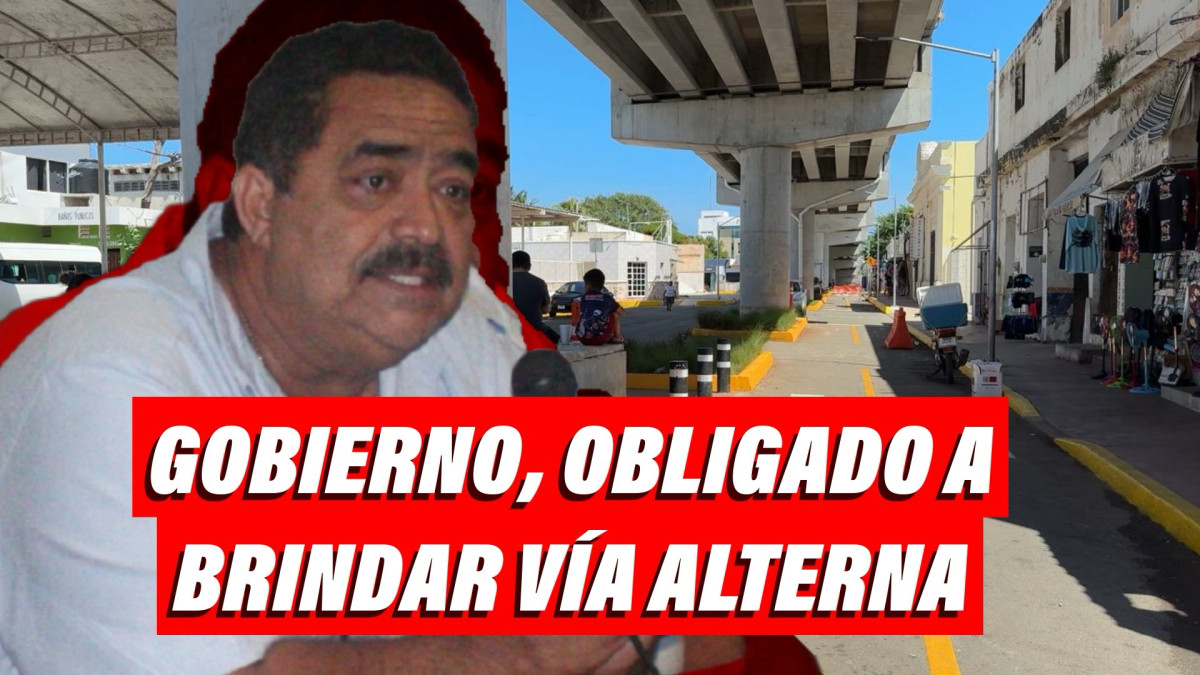
PROGRESO – Transportation businessman Luis Martín Alonzo Morales, director of Transportes Directos, warned that the State Government is legally obligated to guarantee a toll-free alternate route before putting the elevated viaduct on 82nd Street into operation, and that the concessionaire company must allow free use of the bridge when that alternate route becomes impassable. He explained that these points are clearly established in the Yucatán State Highway Law, but are not explicitly stated in the concession agreement granted to the viaduct operator.
Alonzo explained that Article 30 of the law stipulates that the state executive branch must ensure the existence and operation of a toll-free alternate route, an essential condition for granting a concession. He noted that this route must be functional, sustainable, and capable of handling heavy traffic without disrupting commercial activity or causing inconvenience to the population, especially in a municipality like Progreso.
The businessman also referenced Article 36, which states that the concessionaire is obligated to allow free passage without tolls when the alternate route is temporarily impassable, whether due to accidents, protests, neighborhood closures, sinkholes, or traffic congestion. In his review of the concession agreement, he asserted that he found no clause guaranteeing this right to transporters, which he considers an omission that must be addressed before opening the viaduct.
Another point of concern is the extension of the concession term. The original document, granted on February 15, 2023, established a 30-year term, but an amendment made on July 9, 2024, extended it to 40 years, even though the viaduct has not yet become operational. Alonzo pointed out that Article 31 of the same law states that extensions can only be requested in the last fifth of the term and only when the concessionaire has already demonstrated compliance with the imposed conditions, a situation that does not apply in this case.
The businessman maintained that, before opening the viaduct, three essential aspects must be clarified: the mandatory alternate route that the State Government must guarantee, the free use of the viaduct when that alternate route becomes impassable, and a review of the concession extension to verify its compliance with the legal framework. He added that these clarifications are necessary to provide legal certainty for transporters and protect the port’s economic activity, preventing future conflicts that could affect Progreso and its communities.
APM Terminals Announces Major Modernization of Puerto Progreso Container Terminal in Mexico Nov 12, 2025

MXN 3 Billion Long-Term Investment Over 19 Years to Transform Yucatán’s Logistical Hub
APM Terminals Mexico has announced a comprehensive modernization plan for its Puerto Progreso Container Terminal, involving staged long-term investments of approximately MXN 3 billion over the next 19 years. The extensive project aims to deliver more efficient operations, higher safety standards, full logistical visibility, and reliable service, thereby contributing significantly to the economy and development of Yucatán and southeastern Mexico.
The modernization plan encompasses infrastructure upgrades, equipment renewal, the implementation of advanced technology, and a focus on Lean principles to continuously improve operations.
Strengthening Regional Connectivity
Through this initiative, APM Terminals Mexico seeks to advance Puerto Progreso into a new stage of logistical development, raising operational standards and strengthening maritime and logistical connectivity in the region. The project is also expected to generate employment and development, boosting the state’s economy and supporting the local community under a vision of shared prosperity.
Keith Svendsen, CEO of APM Terminals, stated that the long-term project at APM Terminals Yucatán is a pivotal step in modernizing infrastructure, boosting capacity, and strengthening Mexico’s position in global trade. He highlighted that the investment introduces new equipment, smarter terminal design, and advances the company’s decarbonization strategy.
Beatriz Yera, Managing Director of APM Terminals Mexico, added: “We will invest to boost the state’s economic and commercial development while continuing to share our expertise and create synergies with authorities, local businesses and port service providers. Our goal is to establish Puerto Progreso as a benchmark in port innovation and technology: a more efficient and sustainable port, benefiting Mexico and all Mexicans.”
A Memorandum of Understanding was also signed with the state government to contribute to Yucatán’s logistical development and allow APM Terminals to share its global experience and best practices in operating advanced container terminals.
Crowds Flock to Progreso Port to Visit Cuauhtémoc Training Ship
Nov12, 2025

PROGRESO, Yucatán — Long lines formed at the Progreso port this weekend as families and tourists eagerly waited to board the Cuauhtémoc Training Ship, Mexico’s iconic naval vessel currently docked for public visits. The ship’s arrival drew thousands, turning the usually quiet port into a bustling hub of activity.
Visitors began lining up early in the morning, with wait times stretching over an hour by midday. Many came from Mérida and surrounding towns, excited to explore the vessel known for its international voyages and elegant design.
Children waved flags and posed for photos with uniformed sailors, while adults admired the ship’s towering masts and polished decks.https://www.facebook.com/plugins/video.php?height=312&href=https%3A%2F%2Fwww.facebook.com%2Freel%2F1457215088696203%2F&show_text=true&width=560&t=0
The Cuauhtémoc, operated by the Mexican Navy, serves as a floating ambassador of Mexican maritime tradition. Its stop in Progreso is part of a national tour aimed at promoting naval heritage and civic pride. Onboard, guests were treated to guided tours, historical exhibits, and live demonstrations by cadets.
Local vendors and food stalls also benefited from the influx, turning the visit into a festive community event. Authorities praised the turnout and emphasized the ship’s role in fostering public engagement with the armed forces.
The Cuauhtémoc will remain open to visitors through Wednesday, November 19th, before continuing its tour.
Destruction Of Archaeological Site in Kinchil Linked To Poultry GiantBulldozers have damaged or destroyed building foundations and burial sites

Kinchil’s community council is holding talks with members of the ejido and government agencies in an attempt to halt the destruction of historical sites and large swaths of low-laying jungle.
Ancient structures at the archaeological site of Tzemé are being destroyed to make way for the expansion of a poultry farm, residents of Kinchil in Yucatán, Mexico, report. The demolition, allegedly carried out by Crío — one of Mexico’s largest egg and chicken producers — has also resulted in the deforestation of several acres of surrounding jungle, according to the Kinchil Community Council.
The destruction of sections of the archaeological site and the surrounding low-lying jungle comes despite an injunction against the project by the INAH, and unconfirmed threats of sanctions by Mexico’s environmental agency, Profepa.
“They come, destroy the farms we have worked on for generations, destroy our heritage, and leave us with nothing but the smell of excrement,” a clearly angry farmer, Felix Canul, said in a social media post.
Destruction of Yucatán’s Cultural Heritage
The archaeological site of Tzemé is recognized by Mexico’s National Institute of Anthropology and History (INAH) as the ancient western capital of the Yucatán Peninsula. Archaeological evidence indicates the city was once home to over 10,000 people, a population larger than the current municipality of Kinchil. The site contains several Maya pyramids and structures, including one reaching 20 meters in height.

Community representatives state that Crío has cleared more than six hectares of low-lying forest, approximately 300 meters from the main pyramids. This deforestation has damaged or destroyed underlying archaeological structures, including building foundations and burial sites. A specific, spiritually significant location known as Kolotso has also been leveled. During an inspection, community members reported seeing unstudied archaeological material, including ceramics, jade, and carved stones, scattered across the area.
Community Livelihoods Threatened
The environmental damage directly threatens the economic base of the local Maya community, which relies on livestock and, critically, beekeeping. Residents report that the noise from heavy machinery has scared their cattle. More significantly, they fear the expansion of the poultry farm will severely impact the local bee population.
Beekeepers like Modesta Canul explained to Proceso that honeybees are highly sensitive to contaminated air and strong odors, which drive them away. The loss of bees would cripple local honey production and disrupt the pollination of local flora. Gregoria Dzul, a member of the Community Council, stated that the existing poultry sheds already cause nuisance, leaving behind “manure, stench, and flies,” with no benefit to the community.
Legal Actions and Alleged Violations
In response to the destruction, the Kinchil Community Council filed a formal complaint with INAH on October 17. INAH inspectors visited the site, confirmed the damage to the archaeological vestiges, and subsequently ordered a work stoppage, placing official seals on the property to suspend all construction.
Despite this order, on November 3, community members discovered Crío personnel working at the site with heavy machinery, in clear violation of the suspension. This has led to public frustration and questions about enforcement. The community is also calling on the federal environmental protection agency, Profepa, to take decisive action and, if necessary, invoke federal authority.
Not an Isolated Incident
Incidents like the one currently unfolding in Kinchil have been on the rise over the past decade, as the growing demand for land by large industries has come into conflict with the livelihoods of locals, as well as the integrity of cultural heritage sites and the environment.
During the past year, there have also been allegations of corruption linking the mayor of Kinchil with illegal sales of ejido land.
Crío did not respond to repeated requests for comment regarding the conflict in Kinchil. An upcoming press statement is expected to deny knowledge of the problem.
Authorities failed to deliver: the Progreso elevated viaduct was not inaugurated and remains closed
It had been reported that it would open this Monday, November 10th. There is no official information on the reason. There would be new neighborhood protests and street blockades. Nov 10, 25 ProgresoHoy
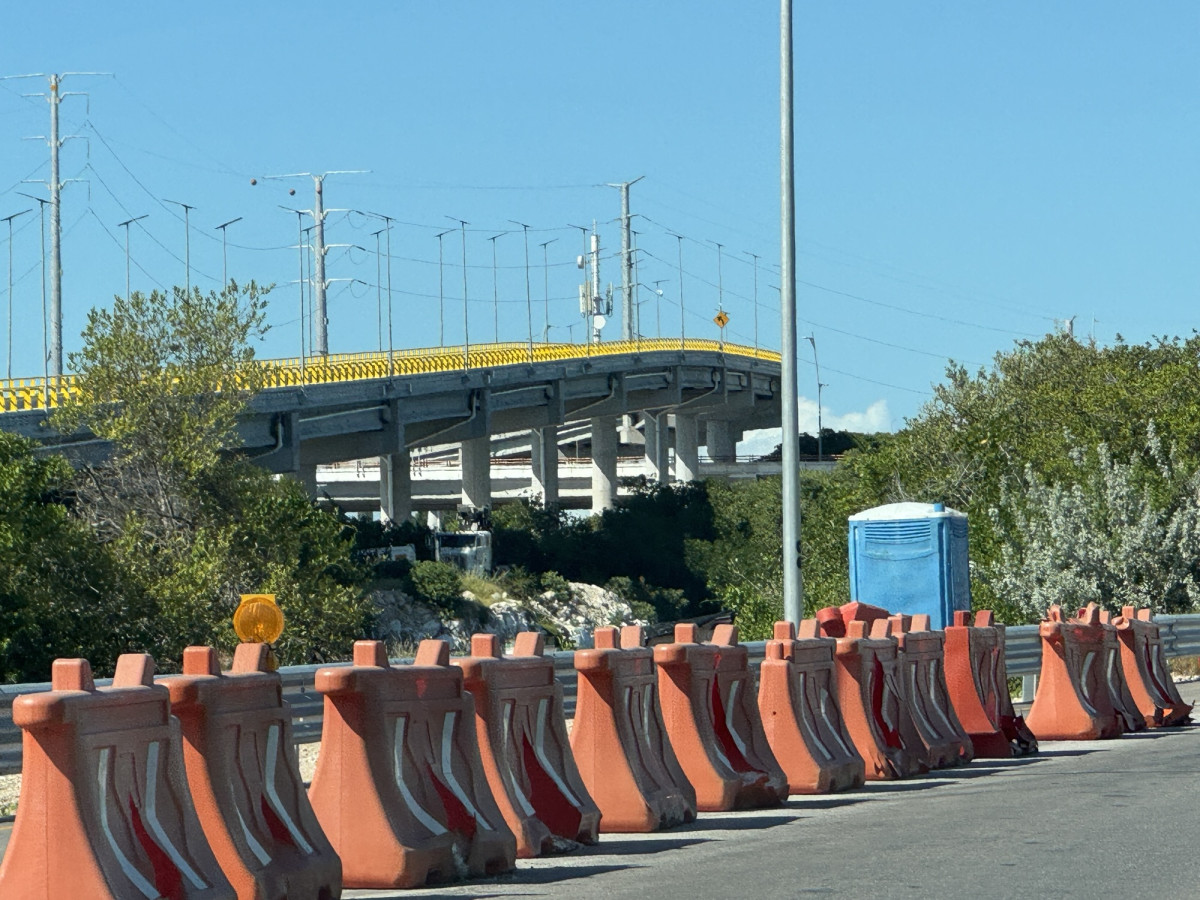
PROGRESO – The residents of Progreso long to reclaim their streets. They have repeatedly stated that they simply want to walk without fear again, see their children cross to school without the risk of a truck, sleep soundly without the walls shaking from passing vehicles, and experience their city as it once was.
Unlike most of the residents of 82nd Street, who accepted monthly support from the state government (then controlled by the PAN party) during the construction of the elevated viaduct, the residents of 25th and 46th Streets have remained steadfast, have not accepted any perks in return, and have carried out increasingly longer blockades to express their discontent.
That hope is what has kept the residents’ demand firm that heavy cargo be removed from the streets of Progreso and taken to the elevated viaduct for which it was built.
This Monday the 10th, the Progreso elevated viaduct was scheduled to finally open for heavy cargo traffic heading to the port. It was even publicly stated that it would be at 9 a.m. with the presence of Governor Joaquín Díaz Mena, but the opening did not take place.
Some reports indicate that authorities are still “in negotiations” to determine the toll that will be charged to users of the viaduct. Other reports suggest that a possible purchase is being considered, although the terms are unknown.
The passage of tractor-trailers to the remote terminal continued today through the interior streets, mainly 46th and 25th for entry and 86th for exit, again generating annoyance and frustration among residents who have been demanding for months that heavy cargo leave their neighborhoods.
The city council, by the way, removed the checkpoint on 46th Street, in front of El Corchito, as was confirmed. The trailers parked again on several streets, blocking entrances to properties, despite the fact that the authorities had announced it was not permitted.
As of this afternoon, no official statement has been issued explaining the reason for the postponement of the viaduct’s opening. Neither the concessionaire, Operaciones Autovía Libramiento Progreso SA de CV, nor ASIPONA Progreso, nor the state government publicly announced a new opening date, despite the fact that the inauguration had already been widely publicized in the media and on social networks, according to what the Undersecretary of Government, Pablo Castro Alcocer, and local congresswoman María Magadán Alonzo told residents.
Residents who have staged several protests and temporary blockades now fear that this latest postponement will allow truck traffic to continue indefinitely within the city, as has been the case since April 2024. If this continues, tensions among residents could rise again in the coming days, with further blockades likely.
Testing Begins on the New Elevated Viaduct in Progreso
written by Yucatan Times November 7, 2025
For two weeks, transit will be free, but afterward, a toll of 1,800 pesos will be charged for single-trailer trucks.
The construction of the elevated viaduct to the Port of Progreso generated 1,500 direct and 5,000 indirect jobs.
The new elevated viaduct to the Port of Progreso will charge approximately 1,800 pesos for single-trailer trucks, while private vehicles will pay less than 20 pesos.
On Thursday, November 6, traffic testing officially began on the new viaduct, which is 2.38 kilometers long.
According to reliable sources, these tasks will span two weeks, during which transit will be provided free of charge. Officials from the National Port System Administration (Asipona) of Progreso are participating in the work.
Construction of the viaduct began on June 13, 2023, and is intended for freight transport. As scheduled, the new roadway will operate 24 hours a day.
Simultaneously, work is underway to install traffic lights at the entrance, located in front of the Progreso International Rowing and Canoeing Course.
In this context, an alternate route for accessing the deep-water port has been designated, in compliance with federal traffic laws. However, its use will be governed by guidelines established by the Progreso City Council, including schedules and regulations regarding weight and weight limits.
According to the project, the elevated viaduct will also reduce excessive noise and pollution caused by the 12,000 vehicles and 1,400 heavy cargo containers that travel daily through the streets.
It will also have two lanes in each direction, with shoulders that will allow all cargo transport to travel from the deep-water port to the federal highway without having to pass through the town center.
The president of the National Chamber of the Transformation Industry (Canacintra) in Yucatán, Alejandro Gómory Martínez, indicated that they are awaiting official notification of the toll rates and support the opening of this road infrastructure, which will prevent trucks from circulating within the port.
He insisted that initially the project would be beneficial; however, if the cost is “unaffordable,” the infrastructure will not be very useful. When asked what the ideal cost would be for businesses, Gómory Martínez responded that it should simply be “zero.”
TYT Newsroom
The ‘green gold’ miners from Korea: A forgotten diaspora
Rosario Bae Nov 4, 2025
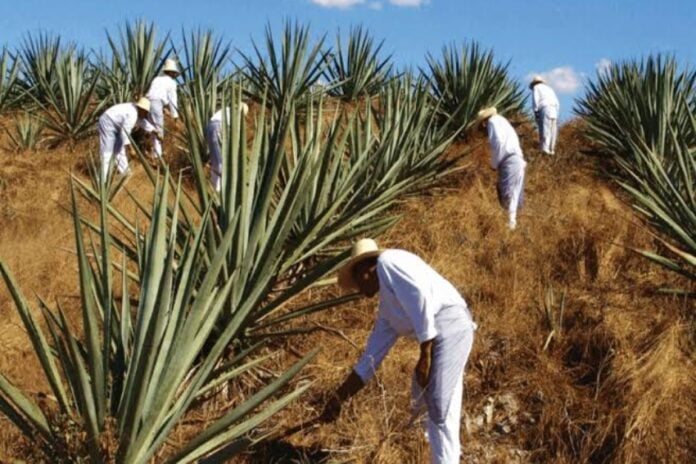
In 1904, under President Porfirio Díaz, American capital rapidly expanded into Mexico’s mines, oil, and railroads. During Yucatán’s henequén boom, the “green gold” made the state one of the richest in the country at the turn of the 20th century. This economic surge created a demand for imported labor — setting the stage for immigration from Asia. Across the Pacific, Korea was entering a crisis of its own. Japan’s victory in the Russo-Japanese War (1904–1905) made the loss of Korean sovereignty seem inevitable. While activists resisted colonial rule, many Koreans sought survival through emigration. Newspapers at the time promised a better life on plantations in California, Hawaii and Mexico.
That same year, on May 14, 1905, 1033 Koreans boarded the British ship Ilford at Jemulpo Port (now Incheon) and arrived at Progreso, Yucatán. They came as contract laborers for the haciendas. Five years later, in 1910, Korea was formally annexed by Japan, leaving them stateless. As the Mexican Revolution dismantled the plantation system, they lost their only source of livelihood. When the hacienda economy collapsed in 1921, about 300 Koreans embarked on a new journey to Cuba, where they found work on sugarcane plantations.
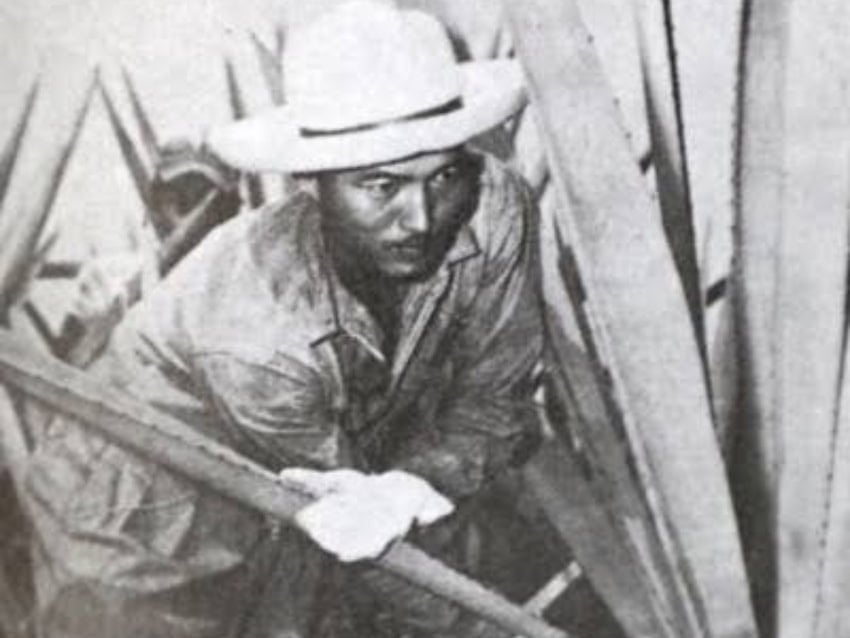
The 1973 book “Memorias de la Vida y Obra de los Coreanos en México desde Yucatán” by José Sánchez-Pac documents the story of the Korean diaspora in Yucatán. It traces his parents’ years of forced labor under harsh conditions. Martha Lim Kim, a fourth-generation descendant of Korean immigrants in Cuba, tells how the community preserved its identity through her book “Coreanos en Cuba,” reflecting a shared spirit of Korean resilience and Cuban solidarity. Despite the poverty that followed the collapse of the sugar market, Koreans in Cuba continued to send patriotic funds to support Korea’s independence movement.
The seeds of immigrant success
Kim Ik-joo (Joaquín Kim, 1890–1956) boarded the Ilford at the age of 15 and began his new life as a contract laborer at the Chocholá hacienda in Mérida. After four years of labor, he moved to Tampico, where he started a tea business and later opened Mexico’s first Korean-style duplex cafeteria. Building upon his financial success, Kim devoted himself to the vision of a self-governing Republic of Korea. He became a unifying figure among Koreans scattered across the continent until he died in Mexico City, shortly after the Korean War.
Survival in exile: education above all else
Lacking access to formal education, the first generation of Korean immigrants learned new languages and adapted to a new culture. Working alongside indigenous Maya laborers on the haciendas, they first learned the Mayan language before Spanish. Recognizing the power of learning, Korean community leaders in Mexico placed education above all else. Determined to create their own opportunities for education, they established schools across haciendas and marketplaces throughout Yucatán. Language and tradition became their anchor of identity, helping the first Koreans in Mexico gradually open doors to Mexican society.
In 1910, the first Korean national school, Sung-Mu School (????), was established. The school taught Spanish and the Korean language and history, as well as traditional martial arts such as Taekwondo. Soon after, Jin-Sung School (????) was founded at the Itzincab plantation, Ui-Seong School (????) in Oxtapacab, and Ban-Do School (????) in Lepa. In 1917, Hae-Dong School (????) in San Sebastián became the first Korean school to receive official recognition from Mexico’s Ministry of Education. Earlier in 2025, a commemorative plaque was unveiled at San Benito Market, honoring more than a century of cross-cultural legacy by Jung Gab-hwan, the chairman of the Institute for Korean Historical Issues (Latin America Branch).
Mérida: beyond migration, a shared legacy
Today, Mérida is home to the Korean Descendants Association of Mérida, chaired by Duran Kong. As the capital of Yucatán, the city has embraced this history as part of its identity, making Mérida a unique place where the past and present of Korea and Mexico coexist. Landmarks across the city invite visitors to this shared heritage. The Centennial Monument of Korean Immigration, engraved with the names of all 1033 young individuals who first arrived in Mexico, stands as a tribute to the pioneers of the Korean diaspora.
Beside the monument stands the Hospital de la Amistad Corea–México (Korea–Mexico Friendship Hospital), built on land donated by the state of Yucatán in 2005. Today, this public hospital serves as a modest pediatric facility equipped through Korean cooperation programs.
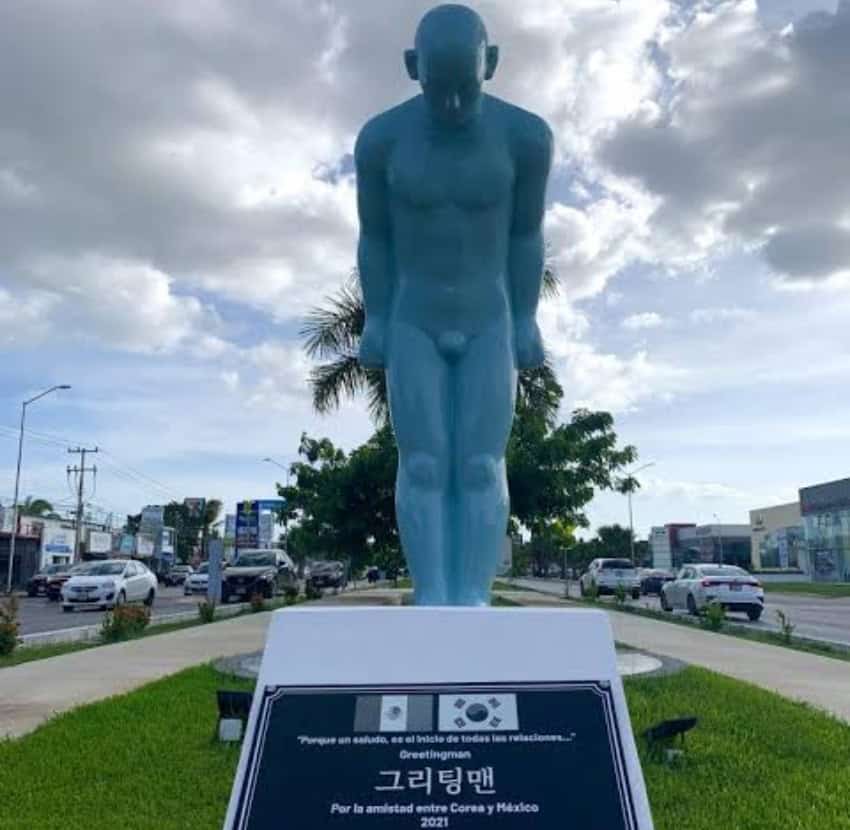
Avenida República de Corea honors the enduring history between the two nations. In 2021, Korean artist Yoo Young-ho’s blue sculpture “Greetingman” was installed along the avenue. Depicting a traditional Korean bow of gratitude, the figure symbolizes mutual respect between the two cultures. The nearby Esquina El Chemulpo, named after the port of Incheon, carries a poignant memory of a man who once cried out the name of his homeland at this corner — a voice that still echoes through the city.
When Korean history meets Mexican muralism
The Museo Conmemorativo de la Inmigración Coreana opened in 2005 at the Centro Histórico, Mérida, under the direction of Dolores García Escalante. El Muro de la Memoria (Wall of Memory) is a collaborative mural project by Mexico City-based Korean artist Long Bae and Mexican muralist Laite. Incorporating Korea’s traditional dancheong patterns with Mexican cactus motifs, the mural commemorates the 120th anniversary of Korean immigration to Mexico, a country where muralism has long served as a language of collective memory.
Echoes across generations and continents
During a time of rising anti-immigrant sentiment, the story of the Koreans who arrived in Yucatán in 1905 reminds us that migration is not only about survival, but about building sustainable communities grounded in hope. Today, K-pop’s global reach has forged new cultural bridges between Korea and Mexico, allowing those early voices of resilience to continue inspiring generations across both nations. Carrying that legacy forward, HYBE Entertainment, a global K-pop powerhouse, embodies how pop culture can transcend borders and generations alike.
Beyond borders: HYBE’s new chapter in Latin America
In 2023, HYBE launched its Latin America headquarters in Mexico City, marking a major milestone in its mission to globalize K-pop through diversity. As part of this initiative, the company introduced Santos Bravos, its first reality competition aimed at forming a Latin American boy band. Santos Bravos premiered on YouTube in August 2025, with new episodes released weekly.
The program’s mentors include Kenny Ortega, the acclaimed choreographer best known for High School Musical; Johnny Goldstein, the hitmaking producer who has collaborated with Shakira; and RAab Stevenson, the renowned vocal coach of Justin Timberlake and Rihanna.
Sixteen young performers from Mexico to Spain have come together on one stage, embodying the rise of K-pop’s global influence. Among them is Kauê Penna, the Brazilian prodigy who won The Voice Kids Brazil in 2020. Together, they unite world-class expertise with emerging new talent to shape the next generation of Latin K-pop artists. Reviving the educational spirit of Korea’s early pioneers, this project fuses the discipline of the K-pop training system with the passion and artistic flair of Latin culture, forging a bold new global K-pop movement.
Rosario Bae is a Korean freelance journalist
No to trucks!: Neighbors block 25th Street at 62nd again
This is the fifth blockade carried out by residents in the streets of Progreso (the third this month of October) / They warn that the blockades will become more frequent and longer due to the lack of action by the authorities.

PROGRESO – For the third time this October, residents of Progreso blocked the passage of tractor-trailers in this port city.
The blockade, as previously reported, is to demand that municipal, state, and federal authorities finally begin using the elevated viaduct on 82nd Street and prohibit tractor-trailers from using Progreso’s streets, specifically 46th Street, 25th Street, and 86th Street.
Residents point out numerous problems, as the passage of heavy vehicles has caused cracks in their properties, in addition to noise and damage to power, telephone, and internet lines. Furthermore, the tractor-trailers speed and park haphazardly, blocking access to properties in the area.
Although the Progreso City Council offered to address the issue, the truth is that everything remains the same, leading residents to continue their protests, which will become more frequent and prolonged.
Recent Comments